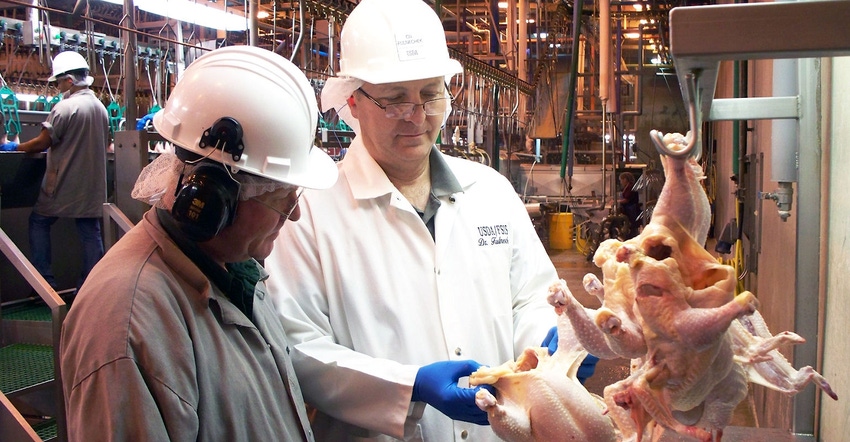NCC seeks waiver to allow young chicken slaughter facilities to operate at any safe line speed if participating in food safety and inspection pilot programs.

The National Chicken Council (NCC) requested in a petition that the U.S. Department of Agriculture’s Food Safety & Inspection Service (FSIS) lift the line speed cap for poultry slaughter facilities that was set in the 2014 regulation creating the New Poultry Inspection System (NPIS).
The petition to Carmen Rottenberg, acting deputy undersecretary for food safety, asks FSIS to implement a waiver system to permit young chicken slaughter establishments participating in the NPIS and the Salmonella Initiative Program (SIP) to operate without the line speeds limitations of 140 birds per minute (bpm).
NPIS is based on a 15-year pilot program that the agency conducted in 25 poultry plants – 20 chicken and five turkey facilities – that permitted those plants to operate at higher line speeds with fewer USDA inspectors stationed on the slaughter lines.
NCC said the waiver could be established for facilities that already participate in both NPIS and SIP. The facility would develop a process for monitoring and ensuring that it is maintaining process control at its chosen line speed, along with corrective actions to regain process control if lost. FSIS would waive the line speed limitation and instead allow participating establishments to operate at any line speed at which they can maintain process control.
“Granting establishments a waiver of the arbitrary line speed limitation would allow all NPIS establishments the flexibility to choose to operate at appropriate line speeds based on their ability to maintain process control, thereby leveling the playing field within the U.S. chicken industry, eliminating competitive barriers between the U.S. and international chicken producers, removing arbitrary limitations on operational control in establishments and encouraging more establishments to participate in NPIS,” NCC said in its waiver petition.
The petition stated that 20 plants participating in the HACCP-Based Inspection Models Project (HIMP) have been authorized to operate with line speeds up to 175 bpm since 2007, and FSIS has recognized that these plants provide the same or better levels of food safety than plants operating with a maximum line speed of 140 bpm.
While USDA projected that 219 of the 280 poultry slaughter plants would convert to NPIS, fewer than 75 have requested to convert. According to the petition filed earlier this month, the chicken industry claims that the line speed cap is holding the plants back.
Food & Water Watch opposes the petition. The advocacy group opposed the final rule creating NPIS and challenged the legality of the new inspection system in court.
“We were concerned about the food safety implications of implementing NPIS, and we also believed that USDA did not take into consideration worker safety and animal welfare concerns when making this dramatic change to poultry inspection,” Food & Water Watch executive director Wenonah Hauter said. “The only positive in that final rule was the cap on the line speeds in chicken plants to 140 birds per minute instead of increasing them to 175 bpm, as USDA had originally proposed, but even at 140 bpm, a lone USDA inspector is checking 2.33 birds every second under NPIS as opposed to the one bird every two seconds under the traditional inspection system.”
As evidenced by a six-month industry survey of both NPIS and non-NPIS establishments, NCC said there are “significant and compelling food safety incentives to allow for an increase in line speed.”
Food & Water Watch challenged the food safety studies cited in NCC’s petition, noting that “since the NPIS rule was implemented in 2014, Food & Water Watch discovered that the agency’s salmonella testing program prior to July 2016 was flawed for all poultry plants, and it had to change its protocols. The National Chicken Council had previously complained to the FSIS that the more stringent salmonella performance standards implemented by the agency in May 2016 were based on the data gathered when the testing program was flawed.”
NCC, in the end, argued, “The incentive to operate at greater line speeds would encourage more plants to participate in NPIS and SIP, allowing both industry and FSIS to capitalize on the cost savings anticipated in the proposed rule.”
About the Author(s)
You May Also Like




.png?width=300&auto=webp&quality=80&disable=upscale)
